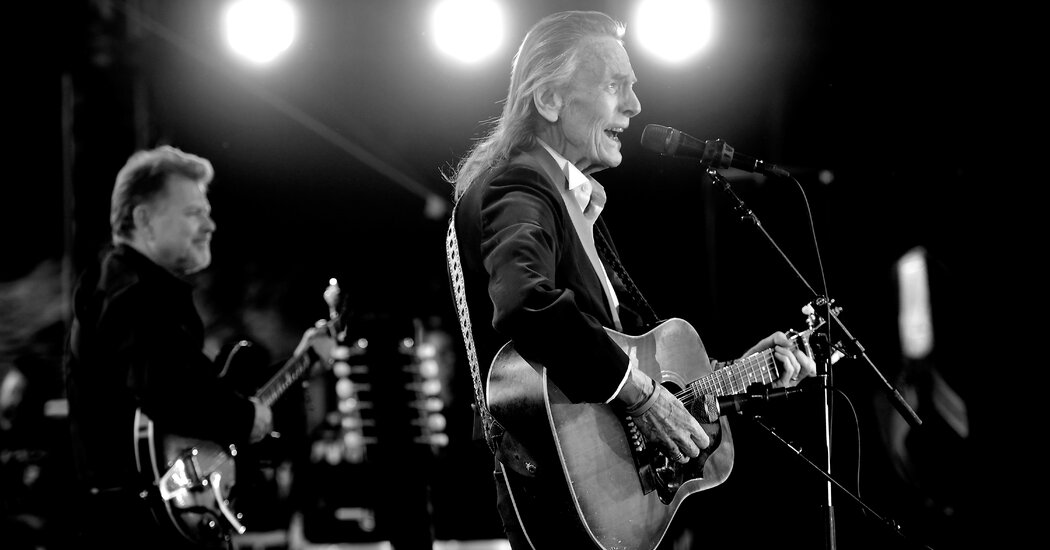
Bob Dylan once named Gordon Lightfoot one of his favorite songwriters, and called the musician “somebody of rare talent” while inducting him into the Canadian Music Hall of Fame in 1986. On Dylan’s 1970 album “Self Portrait,” he even recorded Lightfoot’s “Early Morning Rain,” and the respect was mutual — Lightfoot listened carefully to Dylan’s songs, which instilled in him “a more direct approach, getting away from the love songs,” he once said.
In an expansive career that drew from Greenwich Village folk and Laurel Canyon pop, Gordon Meredith Lightfoot Jr., who died on Monday at 84, was embraced by a diverse group of musicians: Elvis Presley and Duran Duran, Lou Rawls and the Replacements. He sang in a rueful baritone full of tenacity and an almost professorial air, and specialized in songs that dwelled on solitude, or recounted unhappy relationships, in grounded language that drew on folk and blues modes.
“Lightfoot’s is the voice of the romantic,” Geoffrey Stokes of The Village Voice wrote in 1974. “For him (as for Don Quixote, one of his chosen heroes) perfection is always in view and always slipping from his grasp.”
Nowhere was Lightfoot more beloved than in his native Canada, where he helped transform its music industry into a worldwide force. “He sent a message to the world that we’re not just a bunch of lumberjacks and hockey players up here,” Geddy Lee of Rush said in “If You Could Read My Mind,” a 2019 documentary. “We’re capable of sensitivity and poetry.” In the process, Lightfoot became one of the most successful recording artists of the 1970s.
Here are 10 of Lightfoot’s most beloved and impactful songs.
“For Lovin’ Me” (1966)
The folk tradition in which Lightfoot initially worked is full of boastful songs about rambling men who are lighting out for the territory, but this one is uniquely cruel. It’s pushed along by his stout acoustic guitar strumming and David Rea’s sleek fingerpicking accents, which reinforce the lyric’s hauteur. “Everything you have is gone,” Lightfoot tells the woman he’s leaving. “That’s what you get for lovin’ me.” Her broken heart will eventually mend, he adds, at which point “I just might pass this way again.” He later felt some embarrassment about the song, and said, “I didn’t know what chauvinism was.”
“Early Morning Rain” (1966)
Lightfoot grew up in bucolic Central Ontario, which could hardly be farther from Memphis, but he sounds nearly Southern on this simple, brisk folk song, which Presley recorded a few years later. Its theme is homesickness (Lightfoot was living in Los Angeles when he wrote it); the narrator, who’s “as cold and drunk as I can be,” in addition to broke, watches a 707 fly overhead and envies its freedom as he pines for his hometown.
“Did She Mention My Name” (1968)
In this canny depiction of wounded pride, Lightfoot gets together with an old friend to shoot the breeze, but amid the chitchat about sports and mutual acquaintances, he casually slips in a question that reveals his agenda: “By the way, did she mention my name?” This song and “For Lovin’ Me” are fraternal twins, joined by their fascination with male pride.
“Black Day in July” (1968)
Lightfoot mostly worked the personal-relationship side of folk music and left the political side to others. The controversial “Black Day in July” has a restless, unsettled drum track, and describes the July 1967 uprisings in Detroit in which Black residents protested police abuse, prompting the governor to send in the National Guard and the president to send in the army. The song is full of irony, scorn and bafflement (“The soul of Motor City is feared across the land”) and most U.S. radio stations refused to play it.
“If You Could Read My Mind” (1970)
Lightfoot’s commercial breakthrough (it reached No. 5 on the Billboard Hot 100) is also his masterpiece, with assistance from Nick DeCaro’s cascading string arrangement. The lyrics, inspired by his impending divorce, range from poetic to stark, until he reaches the stoic summary: “Stories always end.” The melody inspired Duran Duran’s “Save a Prayer,” and the song has been covered by a who’s who of singers, including Barbra Streisand, Johnny Cash and Neil Young — and, almost, by Frank Sinatra, who tried to record it but gave up, declaring it “too long.”
“Sundown” (1974)
Lightfoot was an alcoholic and a rounder who knew a lot about tempestuous relationships. He wrote “Sundown” while in a jealous fit of fantasy about Cathy Smith, a girlfriend whose cheekbone he once broke during a fight. The lyrics typify his dark, terse romanticism, and the snaking guitar solo is one of the great Red Shea’s finest moments. The song’s been covered by, among others, the goth legends Scott Walker and Depeche Mode.
“Rainy Day People” (1975)
The mid-’70s was Lightfoot’s commercial peak, but this successor to the Top 10 pop hits “Sundown” and “Carefree Highway” didn’t get the reception it deserved. The chords and lyrics call to mind Jimmy Webb, as Lightfoot, with his usual precise elocution, celebrates the way loyal friendships give succor to “high-stepping strutters who land in the gutters.”
“The Wreck of the Edmund Fitzgerald” (1976)
His best-known song is one of the most unlikely pop hits: a six-and-a-half-minute folk ballad about a freighter that sank in Lake Superior a year earlier, killing 29 crew members. It’s also surely the only Top 40 song to ever mention Gitche Gumee, the Chippewa name for Lake Superior. The impish rock band NRBQ sometimes played a slow, out-of-tune cover of the song, and if the audience didn’t like it, it would play it a second time as well.
“The Circle Is Small” (1978)
In some of Lightfoot’s lyrics, it’s difficult to tell whether the conflicts he describes are factual or merely byproducts of a suspicious imagination. In this softly scornful song about cheating, which he recorded in 1968 and rerecorded 10 years later, in a superior version, he believes his lover is using a friend’s apartment to carry on an affair, and he implies that he’ll eventually catch her: “The city where we live might be quite large/But the circle is small.”
“Harmony” (2004)
In the 1980s, as music moved away from acoustic sounds, Lightfoot chased pop success by using synthesizers, drum machines and the producer David Foster, but he didn’t sound like himself. By the time of “Harmony,” he’d returned to working with the guitarists Shea and Terry Clements. Tobacco use had eaten away at the top of his range, but the title song of his penultimate studio album has a fragile, hard-won tenderness that seems to look back at his career (and his life) with peaceful regret.













